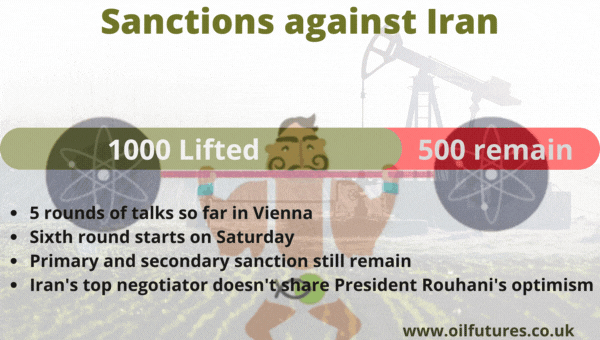The crude oil price fell for a brief period yesterday
at the news that some sanctions against former Iranian officials had been
lifted by the US. Once the fog surrounding the development started clearing,
the momentum of upward trend continued, though; the US simply played it down by
saying the move was just routine.
The reaction to the news by the crude oil markets simply
shows the significance of the Iranian factor in determining the current oil
price.
Despite the assurance by the OPEC+ that the arrival
of Iranian oil into the international markets will be orderly and transparent,
the misplaced anxieties in the markets show no sign of abating.
If the reaction in the oil markets in response to a
minor development such as sanctions against a few individuals being lifted was
like what we saw yesterday, we can just imagine the would-be reaction in the
event of all sanctions being lifted; it’s no exaggeration; the market reaction,
in all probability, will go seismic.
The signatories to the JCPOA, Joint Comprehensive
Plan of Action, known as 2015 Iranian nuclear deal, are meeting again on
Saturday in Vienna, Austria. That is going to be the sixth round of talks; the
negotiators hope it to be the final, despite rapidly evolving geopolitical
aspects.
According to Seyed Abbas Araqchi, the chief Iranian
negotiator and the deputy foreign minister, there has been some progress: 1000
sanctions have been lifted with 500 remain to be lifted, forcing both sides to
enter the most difficult phase of the negotiations.
The forthcoming Iranian presidential elections,
meanwhile, hardly lubricate the grinding wheels of negotiations; the conservative
hardliners of Iran do not want Iran to lose or even reverse its current
leverage, owing to the scale of Uranium enrichment that Iran already has
achieved; it has been the bone of contention for both sides during negotiations
and it can only get more intense during the next week, if they try hard to
achieve the elusive goal of success.
In another development, meanwhile, Lloyd Austin, the
US Defence Secretary, expressed his concern about some Iranian ships heading
towards Venezuela; he says that the Pentagon is monitoring the movements of the
ships and vowing to take appropriate action in the event of the cargo being
turned out to be of military nature – without specifying what action will be in
the offing.
If the US navy personnel board the ships in the
international waters in order to inspect what they carry, it will not go down
very well with Iranians and the US bashing could potentially reach a critical
level once again, while throwing the achievements of the negotiations so far
during the talks on the JCPOA into winds; it’s hardly a catalyst for the
negotiations.
All in all, the negotiations are entering the most
critical phase; not only is it significant to the peace in the region, but also
is crucial for the stability of the crude oil markets – something that will still
be relevant for decades to come.







